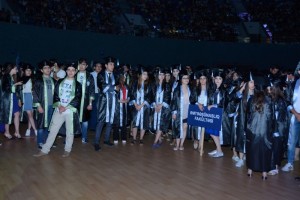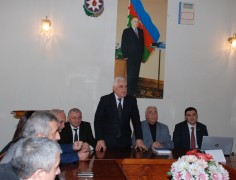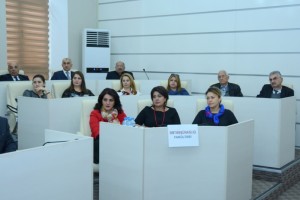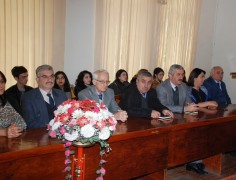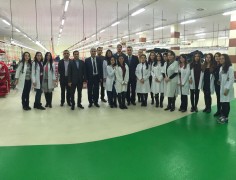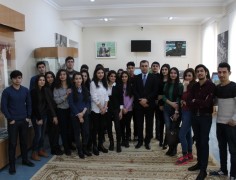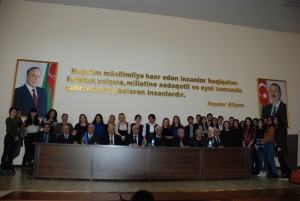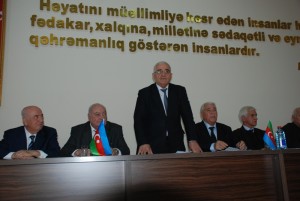FACULTY OF “EXPERTISE AND STANDARDIZATION”
On 19.10.2020, the “Expertise and Standardization” faculty was abolished and the “Engineering” faculty was established on its basis.
The UNEC staff celebrated the Novruz holiday with the children with Down syndrome (16.03.2018)
“The tolerance in İslam” (23.11.2017)
The knowledge competition was held at UNEC (10.11.2017)
The Conferences devoted to the Great Leader develop Students’ Scientific Potential (05.05.2017)
UNEC Students got acquainted with the Modern Production Technologies (23.11.2016)
The “National Flag Day” celebrated at UNEC (08.11.2016)
Event held UNEC within the “Health Month” (02.11.2016)
A Scientific-practical Workshop dedicated to the International Standardization Day at UNEC (18.10.2016)
A Conference held at the School of Commodity Research: “Consumer Product Safety” (10.05.2016)
Undergraduate Students of the School of Commodity Research visited the Museum of the National Education (10.02.2016)
UNEC Student will be able to use the laboratories of the Institute of Oil- Chemical Processes (17.12.2015)
UNEC Students were provided with the opportunity of choosing their workplace in advance (10.12.2015)
Discussions on the Standards of Consumer Products held at UNEC (26.11.2015)
The Scientific Seminar held at UNEC: Current Situation of the National Standardization system in Azerbaijan (20.11.2015)
About the faculty
In order to ensure the implementation of the decisions of the online meeting № ESH-172 of the UNEC Scientific Council dated 31 May 2020, and № ESH-173 of the online meeting dated 14.09.2020, on 19.10.2020 “Expertise and standardization ”faculty was abolished and“ Engineering ”faculty was established on its basis.
By the order of the Scientific Council of UNEC 829/3/2018 № from 25.09.2018, the faculty of Commodity Studies was renamed the faculty of Expertise and Standardization.
In the 1930s, the country began to train highly qualified specialists in the field of commodity science. Staff training was conducted under various names in the Trade-Cooperative, Consumer Cooperation, Soviet Trade, Socio-Economic and Azerbaijan National Economy Institutes. As a result of the merger of several institutes, one of the 6 faculties (Plan-Economics, Finance-Economics, Credit-Economics, National Economy Accounting, Law) that existed in the 1930s after the establishment of the ANEI named after Karl Marx was the faculty of Soviet Business. In those years, two departments – “Commodity Studies” and “Economic Organization and Techniques of Soviet Trade” functioned at this faculty. At that time, the department of Commodity Studies was headed by senior teacher A.U. Guliyev. In the following years, for a long time, the specialty of commodity studies was an integral part of the faculty of Trade and Economics.
In 1959, ANEI was merged with ASU. In 1962, a separate faculty of Commodity Studies was established at ASU. In fact, with the organization of this faculty, a large educational department consisting of the faculties of General Economics and Commodity Studies was established at ASU. In the first years, the faculty of Commodity Studies was headed by prof. Soltan Salmanov, and later by prof. Alasgar Gasimov.
In 1987 the independence of ANEI was abolished and was called Baku branch of LIFE. named after N.A.Voznesenski. In 1990, the specialty of Commodity Studies was removed from Baku branch of the LIFE, and in the same year it began to operate as the Faculty of Commodity Studies of the Azerbaijan Institute of Technology. From September 1, 1993 to June 13, 2000, the branch functioned as an independent Baku Commodity-Commercial Institute. During these years, the institute was headed by prof. A.R. Hasanov.
On June 13, 2000, by the Decree of the President of the Republic of Azerbaijan, the Baku Commodity-Commercial Institute was merged with Azerbaijan State Institute of Economics and Azerbaijan State University of Economics was established. However, despite the abolition of the institute, the functions of all its faculties, departments, divisions and units were retained as a major educational unit for technical and technological specialties of the University of Economics. The department included 4 faculties and 17 departments.
In November 2004, many parallel faculties and departments were merged into the relevant structure of the university and two faculties were retained: “Commodity studies”, “Technology and Design” faculties.
